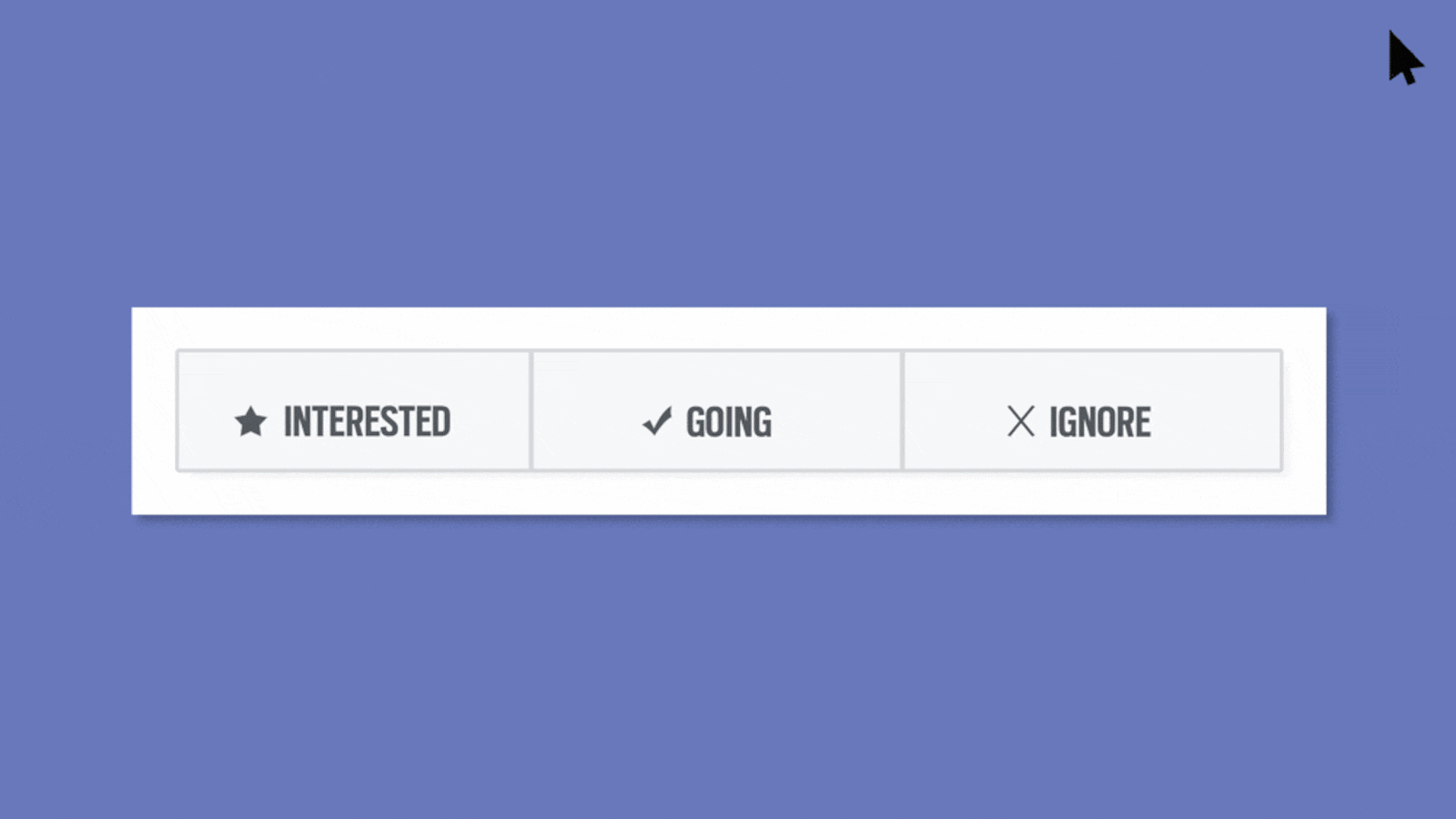Last week I received a holiday party Facebook invite from a friend of mine and immediately smashed the RSVP “yes” button. I have no plans to go, and she knows that.
Before the internet, RSVPs were an efficient way for event organizers to find out who would or would not be attending a party. RSVPs allowed hosts to accurately determine how many supplies to order, how much food and alcohol to stock, and other necessary accommodations.
But as Facebook has become the favored party planning platform for millions of Americans—more than 700 million people use Facebook Events per month and over 130 million Facebook events were created last year—RSVPs now come with a slew of deeper connotations that can be hard to comprehend.
That is because a “no” RSVP isn’t just an admission that you’re not going to be able to make it to the gathering. A no can actively downrank the event in the Facebook algorithm because fewer people see it, whereas a yes promotes it.
“When someone RSVPs ‘yes’ or ‘interested’ to an event, that event may be surfaced in their friends and friends friends feeds,” Facebook spokeswoman Emilie Fetterley told The Daily Beast.
Some people have so much difficulty navigating the tricky subtext behind each response option that they leave countless events unanswered and essentially “on read.”
It’s easy to label people who RSVP yes to almost all Facebook events then fail to show as assholes. But a yes to a Facebook event shouldn’t be read as an indication that that person has any plans to attend. In fact, affirmative RSVPs are becoming the de facto response among friends.
“I think the ‘yes’ RSVP is like an ‘I care about you’ gesture,” said Andrea Hickey, a graphic designer in New York City.
Like many people, her Facebook RSVPs are aspirational. Sure, she’d love to attend that meetup in the middle of the week after a long day of work, but in the end she might not always make it. In those instances she never changes her RSVP to a no.
“If I’m close enough with someone that I want them to know I can’t make it, I’d rather text/message them,” she said.
“I personally say yes to all events I’m invited to on Facebook,” said Daniel Greenberg, 20, a marketer in New York City. “I just think it’s polite. I feel like if a friend thought of inviting me, it’s polite to say yes.” If Daniel knows he can’t actually make it, he’ll send a text.
On Facebook, you can see who has seen your event and who simply missed the notification. If you can’t make it to a party and aren’t close enough to issue an RSVP yes in solidarity and support of the event, then the thing to do is simply not respond or respond with a “maybe” and private message the host that you can’t come. But under no circumstances should you RSVP no.
“I RSVP ‘yes’ when I’m not going but like the person, ‘maybe’ when I don’t like them that much, and never ‘no,’” a co-worker of mine recently tweeted.
The RSVP yes as a gesture of friendship is so ingrained that it can feel like a slap in the face when someone RSVPs no, whether or not you knew they were planning to come.
“When a friend says no, I take offense to that,” said Greenberg. “It means they went out of their way to say no. I think if you invite a friend, it is expected for them to say yes even if they don’t come. If they say ‘no’ it is like a jab that they don’t like you or the event.”
Momentum is key with Facebook events, and too many nos right off the bat can effectively kill even a small cocktail party.
“There’s absolutely a momentum that comes with a ‘yes’ RSVP on Facebook,” said Amy Nelson, an entrepreneur in Seattle. “The more people who respond yes to the Facebook event, the more people learn about the event in their feed.”
She said she regularly RSVPs yes in solidarity with events happening in faraway places to support her network of fellow women entrepreneurs.
“I think to some extent we’re all driven by the fear of missing out, and when we see everyone else is going to show up to a cocktail hour or whatever it is, we want to be there, too,” she said.
Mary, a 29-year-old in Washington, D.C., called the first few hours of a Facebook event’s lifespan “crucial.”
“It sucks to have people RSVP ‘no,’ especially the sort of people who pull others with them when they RSVP yes,” said Mary. “When I’m hosting, I will text the top people I invite and who know can come and have them RSVP yes on Facebook immediately. When I’m invited to something a friend is hosting, I’ll RSVP ‘yes’ pretty much always, or just not RSVP if I’m not going. A ‘no’ is worse than not responding at all.”
It’s even become common for people to invite groups of their out-of-town friends to their Facebook events, knowing they won’t attend but expecting them to RSVP yes as an expression of friendship and support.
“Most my friends live far from me and, with close friends, we will still invite each other to birthday parties or important life things even when we obviously know the person won’t make it,” said Emily Johnson, an editor in Atlanta. “It’s a way of expressing that someone is important to you.”
Ben Moe, a videographer in New York City, said he’ll invite people out of the country to his events, just to keep them in the loop about his life.
“I have friends abroad and when they invite me to their events I’ll RSVP to communicate that I so would have been there and am stoked it’s happening,” said Moe. “I almost view it as sending a message through hitting the RSVP button.”
Worse than a no, however, are the people who not only RSVP in the negative but post inside the Facebook event that they won’t attend or the reason why they’re not going.
Molly Mulshine, an editor in New York City, called the deployment of a hard no “cruel and unusual.”
“It is such bad etiquette,” she said. “How do people not realize how depressing it must be to the person holding the event?”
Mulshine said she’s hosting her own birthday party in a few weeks and specifically said in the ‘about’ section that she’d rather have people decline privately rather than publicly on Facebook. “Clicking ‘no’ is a bit much. Just don’t click any of them! But it’s not as bad as writing on the event’s wall,” she said.
“Never RSVP ‘no’ and only comment on an event invite to help hype the event,” said Mary. “Emojis, talking about how excited you are, pointing out something in the invite that was funny, an inside joke, these are all acceptable things to post in a Facebook event. Not ‘I’ll be in Thailand! So sorry.’”
Of course, for the (often older) Facebook users out there who can’t read the tea leaves of Facebook RSVPs, seeing 200 yeses on an event can throw a big wrench in the planning process.
Brittany Wight, co-founder of a network of local professional women in Baltimore called the Society of Excellent Women, said her events have been plagued by “supportive” yes RSVPs. In some instances hundreds of women have said they’re attending one of her events—and then only a handful actually show up.
To deal with the Facebook yes effect, she’s turned to external ticketing sites like Splash That to get a more accurate number. These external sites handle RSVPs more discreetly, and responses off Facebook don’t carry deeper meaning or algorithmic consequences.
For what it’s worth, Facebook also added an option to issue tickets directly within Events recently. With integration with partners such as Eventbrite, users can RSVP, then purchase tickets via the Facebook event on mobile or desktop.
For those planning upcoming holiday parties, another effective way to force accurate RSVPs is to assign tasks or certain things for people to bring. You can also try sending out a meeting planner.
This can feel weird and overly formal, but with all the public and private events swirling around Facebook during the holiday season, it can also be effective. It’s a lot harder for someone to cancel when they know they’re being counted on to bring dessert to a potluck.
Despite all the confusion around RSVPs, even Wight is reluctant to decline events on Facebook.
“I always mark ‘interested’ if I want to go to an event but I’m not sure if I’ll be able to or just want to show support,” she said.
And she understands why everyone has begun blindly defaulting to yes.
“I think that, even if they can’t attend, it means that they are still a part of the event in a small way,” she said.
Michael, a 30-year-old in San Francisco, has a more direct endorsement of clicking “maybe” or “interested” instead of a no.
“Nobody cares that you’re going to Palm Springs for your five-year high school reunion or whatever it is that you’re doing instead,” said Michael. “Mark yourself as ‘maybe’ and move the fuck on.”






